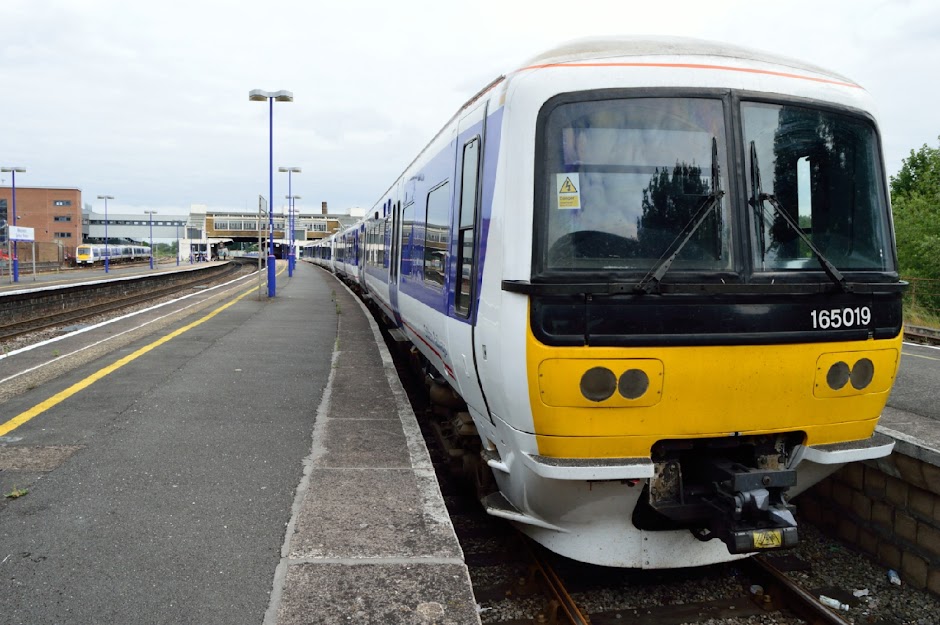Victorian Funeral Railway History  | ||
| Brookwood station, Surrey looking towards London Photo: Charles Moorhen |
Brookwood railway station, Surrey, opened in June 1864, on the former London & South Western Railway (L&SWR) line, between Woking and Basingstoke, is one of those nondescript places to which the average rail passenger would not give a second glance.
But, in the overall history of L&SWR, later to become the Southern Railway, Brookwood Station played a bizarre and fascinating role.
Behind the little Victorian-built building, on platform 2 of Brookwood railway station, on the track that runs towards Basingstoke and further on to the west of England, is the largest
cemetery in Western Europe - Brookwood Cemetery. It was the
brainchild of Sir Richard Brown, in response to the serious
overcrowding of London's cemeteries in the 1800's.
In 1849, in order to
transport the dead to their final resting place, the London Necropolis Railway (LNR) began running dedicated funeral trains from
London's Waterloo station, where the LNR had its own platform with
waiting rooms, to Brookwood Cemetery around 27 miles away in Surrey.
Up until the 1930's,
any suitable locomotive available was used to haul the funeral
trains. After that, and until the LNC officially ceased it
operations just after World War Two, the trains were usually hauled
by an M7 Class steam locomotive.
 |
| Southern Railway Merchant Navy Class Steam Loco Passes Through Brookwood Station Heading Towards Basingstoke - 1950s. Photo: Ben Brooksbank |
 |
| The smaller Brookwood station building, (platform 2), specifically built by the London & South Western Railway for use by funeral mourners. Photo: Charles Moorhen |
(Red asterisk in photo shows exact location of Necropolis Railway station building on platform 2, Brookwood Station, Surrey, England)
On arrival at Brookwood railway station a funeral train, complete with coffin/s and mourners, would slowly continue on past the station for a few hundred yards, whereupon following a change of track points it left the main line and steamed onto a branch line.
Once on the branch line the whole train would reverse down an incline, (incline can still be easily traced on the ground), before stopping at one of the two railway stations built in the grounds of the cemetery - Brookwood Cemetery North or Brookwood Cemetery South.
The former Brookwood Cemetery South station still survives to this day and is privately owned by a religious order.
Once on the branch line the whole train would reverse down an incline, (incline can still be easily traced on the ground), before stopping at one of the two railway stations built in the grounds of the cemetery - Brookwood Cemetery North or Brookwood Cemetery South.
The former Brookwood Cemetery South station still survives to this day and is privately owned by a religious order.
 |
| Former South Station, Brookwood Cemetery Photo: Charles Moorhen |
The LNC offered three classes of funeral. First Class cost £2 10s (equal to £205 in 2015 terms), Second Class cost £1 (about £82 in 2015) and Third Class cost 10 shillings (.50p) or about £41 today.
However, the above prices did not taken into account travel costs for the funeral mourners. A First Class return ticket to Waterloo cost 6 shilling (.30p), Second Class cost 3/6d (17.5p), while a Third Class ticket would set a mourner back the princely sum of 2 shillings (.010p).
A number of famouspeople were buried at Brookwood Cemetery. Two such people were
Robert Knox and Edith Thompson.
Robert Knox was the anatomist who accepted cadavers for dissection from the grave robbers, William Burke and William Hare. Hare saved himself from execution by turning King's evidence against Burke who was hanged and his body dissected.
Edith Thompson was a housewife and milliner whose lover, Frederick Bywaters, murdered her husband Percy. She was judged complicit in the murder of Percy and along with Bywaters, was hanged on the 9th January 1923; she at Holloway Prison; he at Pentonville Prison.
The
last recorded funeral party carried on the London Necropolis Railway
was that of Edward Irish,
a Chelsea Pensioner, who was buried in Brookwood Cemetery on 11 April
1941.
Brookwood Cemetery is open to the public at days and times listed in their website brookwoodcemetery.com which also contains the site's history, notable burials, general information plus details of 'The Brookwood Cemetery Society'.
Don't forget to subscribe to 'Along These Tracks' railway blog to get all new posts and updates sent directly to you.
Blog update:
Previous photo posts are now easier to find.
All blog posts are now listed alphabetically on the right side of your screen; under the heading, 'Previous Photo Posts'.
"I hope this makes your search easier".
Previous photo posts are now easier to find.
All blog posts are now listed alphabetically on the right side of your screen; under the heading, 'Previous Photo Posts'.
"I hope this makes your search easier".







